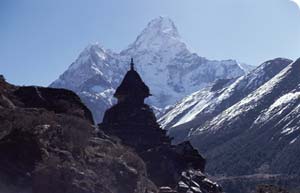 Â Acute mountain sickness may be caused by oxidative damage that results in leaking cerebrovascular fluid.
 Acute mountain sickness may be caused by oxidative damage that results in leaking cerebrovascular fluid.
Oral antioxidants, didn’t make a difference in this study by researchers in the UK.
First, the details.
- 83 healthy lowland volunteers ascended to 5200 meters on the Apex 2 high altitude research expedition.
- Participants were randomly assigned to 1 of 2 treatments.
- 1-gram l-ascorbic acid, 400 IU of alpha-tocopherol acetate, and 600 mg of alpha-lipoic acid (Cultech Ltd., Wales, UK) daily in 4 divided doses
- Placebo
- Prevalence of acute mountain sickness was measured using the Lake Louise Consensus score sheet (LLS).
- Neither the researchers nor participants knew the treatment given — double-blind.
And, the results.
- There was no difference in the incidence or severity of acute mountain sickness between groups at any time at high altitude.
- At Day 2 at 5200 meters, 69% of the antioxidant group and 66% of the placebo group had acute mountain sickness — not significant.
- There were no differences in pulmonary artery systolic pressure, oxygen saturation, presence of a pericardial effusion, or acute mountain sickness as assessed by a visual analogue scale.
The bottom line?
The authors “found no evidence of benefit from antioxidant supplementation at high altitude.”
About a year ago, researchers from Birmingham, UK reviewed pharmacotherapy options to prevent and treat of acute altitude- related problems. They concluded that more research was required to establish the role of antioxidants.
3/11/09 22:3 JR